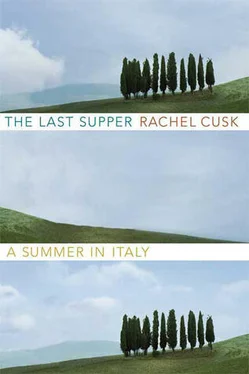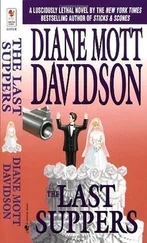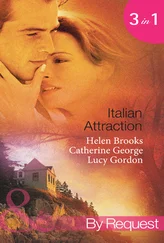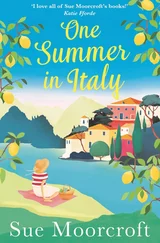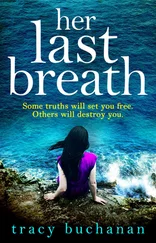Rachel Cusk
The Last Supper: A Summer in Italy
Comes over one an absolute necessity to move. And what is more, to move in some particular direction. A double necessity then: to get on the move, and to know whither.
— D. H. Lawrence, Sea and Sardinia
52 The Last Supper , c. 1592, by Tintoretto (1518–94) (Lucca Cathedral / Scala / Art Resource, New York)
61 Madonna del Parto , c. 1450–70 (post-restoration fresco), by Piero della Francesca (c. 1415–92) (Chapel of the Cemetery, Monterchi, Italy / The Bridgeman Art Library)
69 Hercules , c. 1475 (fresco), by Piero della Francesca (Isabella Stewart Gardner Museum, Boston / The Bridgeman Art Library)
71 The Dream of Constantine , from The Legend of the True Cross cycle, completed 1464 (fresco), by Piero della Francesca (San Francesco, Arezzo, Italy / The Bridgeman Art Library)
74 The Death of Adam , from The Legend of the True Cross cycle, completed 1464 (fresco), by Piero della Francesca (San Francesco, Arezzo, Italy / Alinari / The Bridgeman Art Library)
75 Madonna of Senigallia with Child and Two Angels , c. 1470 (tempera on panel), by Piero della Francesca (Galleria Nazionale delle Marche, Urbino, Italy / The Bridgeman Art Library)
100 St. Francis (fresco), by Cimabue (Cenni di Pepo) (c. 1240–c. 1301) (San Francesco, Assisi, Italy / The Bridgeman Art Library)
102 St. Francis Preaching to Birds , by unknown artist (San Francesco, Assisi, Italy / © The Art Archive / CORBIS)
151 Self-Portrait , c. 1506 (tempera on wood), by Raphael (Raffaello Sanzio of Urbino) (1483–1520) (Galleria degli Uffizi, Florence, Italy / The Bridgeman Art Library)
152 Madonna of the Goldfinch , c. 1506 (oil on panel), by Raphael (Galleria degli Uffizi, Florence, Italy / The Bridgeman Art Library)
157 Sistine Madonna , 1513 (oil on canvas), by Raphael (Gemäldegalerie Alte Meister, Dresden, Germany / © Staatliche Kunstsammlungen Dresden / The Bridgeman Art Library)
160 Portrait of Leo X (1475–1521), Cardinal Luigi de’ Rossi, and Giulio de Medici (1478–1534), 1518 (oil on panel), by Raphael (Galleria degli Uffizi, Florence, Italy / The Bridgeman Art Library)
162 The Veiled Woman , or La Donna Velata , c. 1516 (oil on canvas), by Raphael (Palazzo Pitti, Florence, Italy / Alinari / The Bridgeman Art Library)
180 The Catechism with a Young Girl Reading and the Initiate Making an Offering, North Wall, Oecus 5 , c. 60–50 b.c. (fresco), by Roman (first century b.c.) (Villa dei Misteri, Pompeii, Italy / The Bridgeman Art Library)
SELF-PORTRAIT, WITH DINOSAURS
At night I would often be woken by noise from the road, and afterward would lie awake for hours, unable to sleep. The noise, which was of a strange drunken revelry, would usually begin long after the pubs had closed, though in the deeps of the night I never knew exactly what time it was. I was merely summoned by the sound of unearthly groans and shrieks outside my window that seemed to belong neither to the world nor to my dreams but somewhere in between. They might have been men’s voices or women’s, it was hard to tell. The noise they made came from a region that outlay human identity. Their long, inchoate monologues, vocalized yet senseless, seemed to name something that afterward could not be specified, to describe what by daylight appeared indescribable.
This demoniacal groaning would often go on for so long that it seemed impossible it could be coming from living people passing on the pavements. It was the sound of lost souls, of primitive creatures bellowing far inside the earth. Yet I never got up to look: the noise was so unreal that it was only when it stopped that I felt myself to be actually awake. Then I would lie there, full of a feeling of insecurity, as though the world were a wildly spinning fairground ride from which my bed might work loose and be somehow flung away. The groaning sounds and the darkness and the carelessly spinning earth, offering me its fathomless glimpses of space, of nothingness: all this would run on for one hour or two or three, I couldn’t tell. The hours were blank and sealed, filled with gray information: one after another they were dispatched.
Then another sound would begin, dimly at first, a kind of humming or droning, steady and industrious. After a while it filled the room with its monotonous note. This was the sound of traffic. People were going in their cars to work. A little later a finger of wan light showed itself at the curtains. When I was a child the night seemed as big as an ocean to me, deep and static: you rowed across it for hour after hour and sometimes got so lost in time and darkness that it seemed as if the morning might never be found. Now it was a mere vacuum, filling up with human activity as a dump is filled with discarded objects. It was an empty space into which the overcrowded world was extending its outskirts, its sprawl.
We were living in Bristol at that time, and the slaving past of the city was always present to me, though in the middle-class district of Clifton its brutality was largely semantic, recalling itself amid the boutiques and sofa shops of Whiteladies Road and Blackboys Hill. Yet it seemed to have seeped into the masonry, into the paving stones. I was often told that the beautiful Georgian terraces of Clifton had for years been neglected and threatened with demolition and that students and artists had lived there contentedly in conditions approximating squalor. But that was in the past: these days the slave owners’ houses were smart again and unaffordable, the streets lined with beauty salons and expensive cars, the baize lawns of the private schools trodden by millionaires’ children from China, America, Japan. Clifton estate agents carried themselves with the preening significance of royal courtiers, while the fume-throttled city sprawled below, with its bombed-out center, its ghettos, its miles of strange, impoverished housing, its uneasy atmosphere both of misrule and of a thorough-minded, inexorable division.
Something of the hard-heartedness of that imperial past seemed to live on in the people I met and spoke to every day. Man, woman, and child, they found sensitivity intolerable. Nothing irked them more than the liberal conscience, unless it was an out-spoken sense of injustice. These things impinged on their free bigotry, and on the sense of humor that depended on it. They were not cold or unfriendly; quite the reverse. It was just that their philosophy formed an edifice of startling indelicacy amid the fluted columns and porticoes, the classical perspectives and cloudlike silhouettes, the ancient parks and pavilions, the secret rotundas and rich, ornamented interiors that were their habitat. It was a philosophy composed of two primitive blocks: that everyone should work for what he had; and that what mattered were the good things in life.
Encompassing so little in and of itself, this was a philosophy that required, for the sake of texture, of content, a God — and indeed the churches of Clifton did a thriving trade, on the import and the export side alike. I encountered notions of Christian charity that might have come from the pages of a Victorian novel, so ignorant did they seem of the concept of social democracy, and was beleaguered everywhere by advertisements for the evangelical Alpha course, which, for an initiative that targets those who have lost their way in life, seemed in Clifton to be remarkably well attended. These advertisements took a somewhat startling form: one day I passed one and was driven to stop and look at it twice. It was a photograph of a man in climbing equipment standing in sunlight on the pinnacle of a mountain. I was surprised, almost affronted, by the caption, which read: Is there more to life than this? I wasn’t entirely sure there was, nor ought to be. But I pondered it all the same. It had a profound effect on me, though not quite the one it intended. Whenever I thought of it, I felt myself drawing to the threshold of a revelation, a realization so large that it was difficult to see its full extent.
Читать дальше
